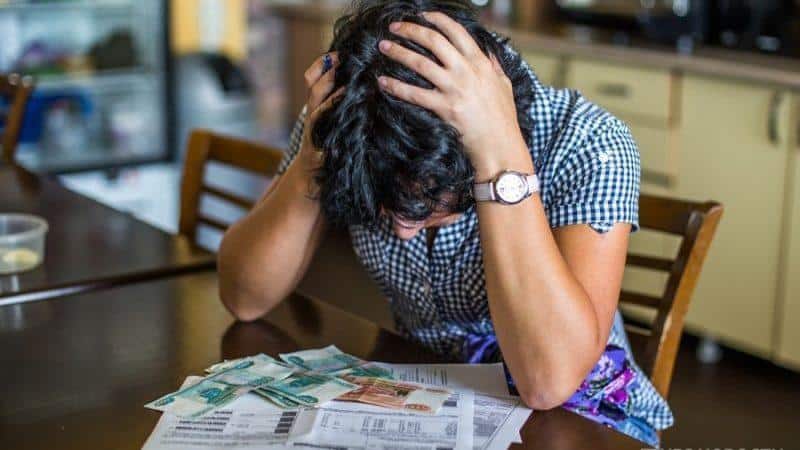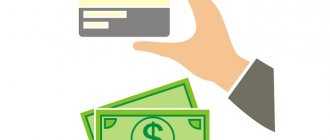Basic moments
Debts on utility bills cannot accumulate indefinitely. Sooner or later, representatives of the management organization will turn to the courts to collect the debt.
This is where the question arises, how to write off utility debts.
There are several cases when debts are written off from a debtor:
- death of a citizen
- declaring an individual bankrupt,
- liquidation of the defaulting organization,
- lack of funds from the debtor.
Now getting rid of debt has become easier than before. A citizen can go to court to declare himself bankrupt. But achieving a positive decision will not be so easy.
How to write off housing and communal services debts
Not only the official debt for utility bills is written off, but also other debts if the court declares the citizen bankrupt.
The rules on when an insolvency claim can be filed are established by Art. 213.4 of the Bankruptcy Law.
2 grounds for filing a claim:
- The amount of debt exceeded 500 thousand rubles.
- The citizen foresees that he will not be able to pay his creditors. Does not have enough cash and property to pay his debts.
To avoid the accrual of penalties, you will need to collect an impressive package of documentation and go to court.
Important! After declaring bankruptcy, the utility debt can be written off. Creditors will be able to bring their claims without going beyond the scope of the insolvency case. Debts are written off only within the scope of the property that the citizen has. A person will not have to pay anything more than the value of the property.
As part of an insolvency case, almost all property can be taken away. The exception is a single house or plot of land. When a person has no valuables at all, the bailiff stops the proceedings. The reason is the lack of property from the debtor.
How to file a motion to apply the statute of limitations
The petition is filed in the same court where the case is being heard. It can be voiced orally directly at the court hearing in the case, it will be recorded in the protocol, and the court will take it into account and consider it, and then make a decision to accept or refuse.
A written petition can also be handed over to the court in the courtroom, or it can be handed over to the office (court reception) or to the assistant judge who has the case.

What to do if you have a debt

To write off debts for housing and communal services, you need to calculate the amount of debt and find out whether they were legally accrued or not.
You need to find out whether payments have been accrued correctly and whether invoices need to be paid. If you do not agree with the accruals made, then you should not simply put them in a box. After all, penalties are charged for each. Therefore, if payments are accrued, you need to immediately go to court. Moreover, it is better to submit a collective appeal when many residents disagree.
Reasons for the formation of utility debt
Each owner of residential and non-residential premises is required to pay monthly bills received from utility services. If the tenants did not live in the apartment for a certain period, this is not a reason for non-payment of bills. In this case, you can only count on a recalculation of the amount of monthly payments, and not on a complete exemption from payment.
In case of failure to meet payment deadlines or completely ignore the need to make payments to the management company that calculates rent, the owner will be charged fines and penalties. In addition, they will increase monthly and be added to the amount of the principal debt.
Debts on housing and communal services can arise for a number of reasons. This may be late payment or complete absence. Also, the payer may not be physically able to pay the receipts due to certain circumstances. Often debts accumulate due to the fact that a citizen is insolvent and cannot make monthly payments for utilities. Let's look at each of these cases in more detail.
Register now and get a free consultation from Specialists
How to find out the amount of obligations

To write off a utility debt, you need to know its exact amount.
4 ways to find out housing and communal services debts:
- using the Internet,
- through a financial institution,
- housing and communal services department,
- directly to the management organization.
Through the Internet
You can find out the amount of debt for housing and communal services through the portal gosuslugi.ru. Here information about the amount of obligations is updated, in addition, you can pay received receipts.
To register on the portal, you must enter your full name, phone number, and email address.
4 steps to obtain information about debt:
- log in to the portal gosuslugi.ru,
- go to your personal account,
- go to the “Accruals” section, “Personal Accounts” tab,
- enter the taxpayer code.
On the “Payment for services” tab, existing obligations can be paid. You can pay for utilities this way when the bill has already been issued.
Through a financial institution
To obtain information and payment, you must contact employees of Sberbank, VTB-24 and other large banks. You must have an old receipt with you to find out the amount of your existing obligations.
Sberbank clients have the opportunity to clarify their obligations through their personal account. In the “Payments and Transfers” section, you must select the organization and service to be paid.
If there is an ATM nearby, you can find out your housing and communal services obligations there. You can obtain information using your personal account number.
Housing and communal services department
Cash settlement center specialists will provide the necessary information. The disadvantage of this method is that you will have to stand in line and wait for an appointment.
There you can also pay off your debts in full or in part, when there is such an opportunity.
Find out your debt

The Housing Code of the Russian Federation contains articles according to which every citizen is obliged to pay for services for the provision of utility systems. The requirement applies to both individuals and legal entities. If a person accumulates debt, the management company is obliged to notify the citizen or company of the need to pay receipts. But notifications do not always reach the addressee.
You can find out about the presence of debts for payment of housing and communal services for a certain premises using:
- State Services portal;
- at the post office;
- in any bank;
- in the management company;
- through ATMs;
- through self-service terminals.
All methods provide equally relevant information about the presence of debts.
Application for debt forgiveness
The question of how to legally write off utility debts can be solved in two ways:
- negotiate with utility companies,
- file a claim in court.
The decision whether to restructure the debt or not depends solely on the position of the organization’s management.
Filing a petition to the court is another way to solve the problem. Taking into account the circumstances, the judge may reduce the amount of fines and leave only the basic amount.
In practice, there are also cases where service providers themselves also owe money to citizens because they issued invoices illegally.
Debt write-off in a management company
The management company can write off the existing debt or carry out debt restructuring. But most often this is not within the scope of interests of the management company, as a result of which the company is in no hurry to make such a decision.
You can force the management company to write off debts. But only through the court. However, in court you will have to prove that the debt is a consequence of good reasons, and not of an irresponsible attitude.
The second option is to try to get a subsidy for housing and communal services. Of course, this method will not get rid of debt obligations, but the amounts in receipts will be significantly less. This benefit is regulated by Article 159 of the Housing Code of Russia.
Only those persons whose total income is less than 88% of the total amount of all housing and communal services can receive the benefit. The income also applies to persons under 18 years of age who live with the debtor legally. For example, these could be your own children or a child under guardianship.
To receive a subsidy, the debtor must confirm the level of income with the relevant documents, as well as submit a document in which the management company agrees to the gradual repayment of the resulting debt.
Circumstances under which the bank is obliged to write off your loan debts
Arbitrage practice
When bills arrive with inflated payments, there are three options:
- pay for services,
- hide the receipts and pay nothing,
- go to court.
The third option was chosen by many residents of the city of Tver when they received receipts from the energy supply organization. The payment amounts were fabulously inflated. Residents of apartment buildings had to contact the prosecutor's office to protect their interests. And the prosecutor went to court to protect citizens. The decision in case No. 2-2249/2015 was made by the Zavolzhsky District Court.
Court findings:
- Invoices for payment are issued without taking into account the square footage of living space occupied by citizens.
- There is no information about which metering devices are connected to the building.
- The supplier issues invoices for payment to consumers when an agreement has not been signed with the management company, but there is an agreement directly with the service provider.
- The fact that the management company has not concluded an agreement with the supplier does not give him the opportunity to demand payment from citizens.
- The issued receipts are considered illegal, and penalties and debt must be written off.
The decisive role in this case was played by the active position of the residents of the house, who appealed the bills issued to them. If you remain silent and simply put off solving the problem, then the bills will continue to come. The amount of liabilities will constantly grow.
Deciding whether debts can be written off takes time and effort. Therefore, it is necessary to apply for the recovery of moral damages and legal costs from the defendant.
Is it possible to write off debts?

It often happens that the homeowner does not mind fulfilling his obligations, but simply does not have such a financial opportunity.
The management company does not simply write off debt. The debtor needs to apply for a subsidy to solve his problem.
Subsidies for paying for housing and utility services are provided to those citizens who spend more than 22% of the income of all family members on paying bills. The rule is established by Art. 159 Housing Code.
Owners and tenants of residential space can receive government support. The problem is that debtors are denied help. Therefore, it is necessary to initially sign an agreement to pay the debt with the company managing the house. The subsidy is provided if an agreement on the gradual fulfillment of obligations is drawn up.
To receive government support, you must be prepared to confirm the income of each family member. If it is confirmed that the citizen really needs government support, the subsidy will be transferred.
You can't just get rid of debt. They will be written off at the request of the citizen. It is necessary to apply to the court or management organization to resolve the issue.
The debt is growing and there is nothing to pay: what to do?
What to do if the debt for the apartment grows, but there is nothing to pay? The first step is to familiarize yourself with the size of the debt. This can be done in different ways:
- the most accurate method is to contact the Criminal Code;
- on the management company’s website in your personal account you can also see the amount of debt;
- banks that provide services for paying for housing and communal services will help not only clarify the amount of debt, but also pay it.

The only real way not to pay utility bills if the formation of rent debt is inevitable is to try to negotiate with the management company
So, if the debt is large and there are no resources to pay it off, then there are several ways to solve the problem:
- Subsidy. This type of government assistance may be provided if rent is more than 22% of the family's total income.
- Installment plan. You should clarify in the Criminal Code about the possibility of paying off the debt in installments. This method can be used provided that there were no previously arrears in paying for housing and communal services.
- Agreement. The owner can enter into an agreement with the management company, in which he undertakes to repay the debt within six months.
- Privileges. Check out Art. 159 Housing Code of the Russian Federation. There is a list of categories of persons who have the right to apply for utility benefits from the state.







